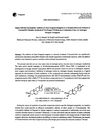 21 citations,
November 2011 in “The journal of investigative dermatology/Journal of investigative dermatology”
21 citations,
November 2011 in “The journal of investigative dermatology/Journal of investigative dermatology” Telogen is an active phase with important biological processes, not a resting phase.
45 citations,
October 2015 in “BMC Genomics” Chicken feather growth involves specific genes and shares similarities with hair development.
45 citations,
September 2001 in “Journal of Investigative Dermatology” Cyclosporin A promotes hair cell growth and affects protein kinase C levels.
23 citations,
December 2013 in “Molecular cancer therapeutics” Breast cancer treatments work better with AR activation, improving results and reducing side effects.
 295 citations,
September 2006 in “Cell Cycle”
295 citations,
September 2006 in “Cell Cycle” The conclusion is that using drugs to block the TOR pathway might slow aging and prevent age-related diseases.
30 citations,
August 2008 in “The journal of investigative dermatology/Journal of investigative dermatology” TGase 3 helps build hair structure by forming strong bonds between proteins.
 3 citations,
July 2017 in “Journal of Molecular Graphics & Modelling”
3 citations,
July 2017 in “Journal of Molecular Graphics & Modelling” The study found that baicalin has different stable shapes in gas and water, with two shapes better for interacting with positive charges in water.
 7 citations,
July 2020 in “Pigment cell & melanoma research”
7 citations,
July 2020 in “Pigment cell & melanoma research” RT1640 treatment reverses gray hair and promotes hair growth in mice.
 13 citations,
March 2013 in “International Journal of Cosmetic Science”
13 citations,
March 2013 in “International Journal of Cosmetic Science” AcSDKP may help prevent skin and hair aging and promote their growth.
 December 2023 in “Scientific reports”
December 2023 in “Scientific reports” Fermented soy protein may help prevent bone loss by affecting bone cell activity.
 33 citations,
June 2007 in “International Journal of Pharmaceutics”
33 citations,
June 2007 in “International Journal of Pharmaceutics” The conclusion is that measuring how drugs partition into artificial sebum is important for predicting their delivery into hair and sebaceous follicles, and it provides better information than traditional methods.
![Synthesis and In Vitro Study of 17β-[N-Ureylene-N,N′-Disubstituted]-4-Methyl-4-Aza-5α-Androstan-3-Ones as Selective Inhibitors of Type I 5α-Reductase](/images/research/d19df8a7-8de6-4430-8a0d-4ffa1f502985/small/15608.jpg) 5 citations,
February 1997 in “Bioorganic & Medicinal Chemistry”
5 citations,
February 1997 in “Bioorganic & Medicinal Chemistry” New compounds were made that effectively block a specific enzyme related to androgen conditions.
 45 citations,
June 2008 in “Journal of pharmaceutical and biomedical analysis”
45 citations,
June 2008 in “Journal of pharmaceutical and biomedical analysis” The method effectively identifies banned substances in hair loss and skin disease cosmetics.
 3 citations,
November 2010 in “Wiley-VCH Verlag GmbH & Co. KGaA eBooks”
3 citations,
November 2010 in “Wiley-VCH Verlag GmbH & Co. KGaA eBooks” Finasteride safely treats enlarged prostate and male-pattern baldness.
1 citations,
July 2020 in “Reviews in separation sciences”  451 citations,
March 2005 in “Endocrine Reviews”
451 citations,
March 2005 in “Endocrine Reviews” The enzyme steroid sulfatase is linked to breast cancer and other conditions, and inhibitors are being developed for treatment.
 1 citations,
February 2010 in “Proceedings of SPIE”
1 citations,
February 2010 in “Proceedings of SPIE” Low level laser therapy may help regenerate hair cells in the ear after damage from gentamicin.
 38 citations,
June 2005 in “Contact Dermatitis”
38 citations,
June 2005 in “Contact Dermatitis” Patient had scalp allergy from minoxidil; test helped identify cause and suggest alternative treatments.
 34 citations,
October 2014 in “European journal of pharmaceutics and biopharmaceutics”
34 citations,
October 2014 in “European journal of pharmaceutics and biopharmaceutics” The new drug delivery system releases the drug better in sebum and targets follicles more effectively than the conventional cream.
 9 citations,
March 2022 in “Antioxidants”
9 citations,
March 2022 in “Antioxidants” Synthetic antioxidants are effective, cheap, and stable, with some like zinc and cholecalciferol reducing child and cancer deaths, but the safety of additives like BHA, BHT, TBHQ, and PEG needs more research.
 October 2022 in “Research Square (Research Square)”
October 2022 in “Research Square (Research Square)” The conclusion is that certain chemicals from Bacillus subtilis help improve plant root growth through a hormone-related process.
 6 citations,
February 2023 in “Plant and Soil”
6 citations,
February 2023 in “Plant and Soil” Bacillus subtilis strain WM13-24 helps plant root growth through volatile compounds.
 23 citations,
September 2015 in “International Journal of Molecular Medicine”
23 citations,
September 2015 in “International Journal of Molecular Medicine” Activating ER-β, not ER-α, improves skin cell growth and wound healing.
 5 citations,
January 2021 in “Journal of Saudi Chemical Society”
5 citations,
January 2021 in “Journal of Saudi Chemical Society” Watercress oil may promote hair growth by activating specific receptors.
 14 citations,
February 1994 in “Tetrahedron Letters”
14 citations,
February 1994 in “Tetrahedron Letters” Adding cerium(III) chloride to Grignard reagents improves the making of compounds that could treat prostate issues and hair loss.
 4 citations,
December 2011 in “Drug Research”
4 citations,
December 2011 in “Drug Research” Two finasteride tablet types are equally effective and can be swapped.
 3 citations,
October 2020 in “Bladder cancer”
3 citations,
October 2020 in “Bladder cancer” 5α-reductase inhibitors don't stop bladder cancer from developing or getting worse.
 17 citations,
May 1998 in “Steroids”
17 citations,
May 1998 in “Steroids” Researchers developed a model to predict how well certain compounds can block an enzyme related to hair loss and prostate issues, suggesting a 50 mg dose of finasteride might be effective based on lab and body data.
 62 citations,
April 2004 in “Expert Opinion on Pharmacotherapy”
62 citations,
April 2004 in “Expert Opinion on Pharmacotherapy” Finasteride effectively treats male pattern baldness, improving hair growth and density.
 32 citations,
April 1999 in “Expert Opinion on Investigational Drugs”
32 citations,
April 1999 in “Expert Opinion on Investigational Drugs” Finasteride effectively treats male hair loss, improving growth and density.








![Synthesis and In Vitro Study of 17β-[N-Ureylene-N,N′-Disubstituted]-4-Methyl-4-Aza-5α-Androstan-3-Ones as Selective Inhibitors of Type I 5α-Reductase](/images/research/d19df8a7-8de6-4430-8a0d-4ffa1f502985/small/15608.jpg)
















